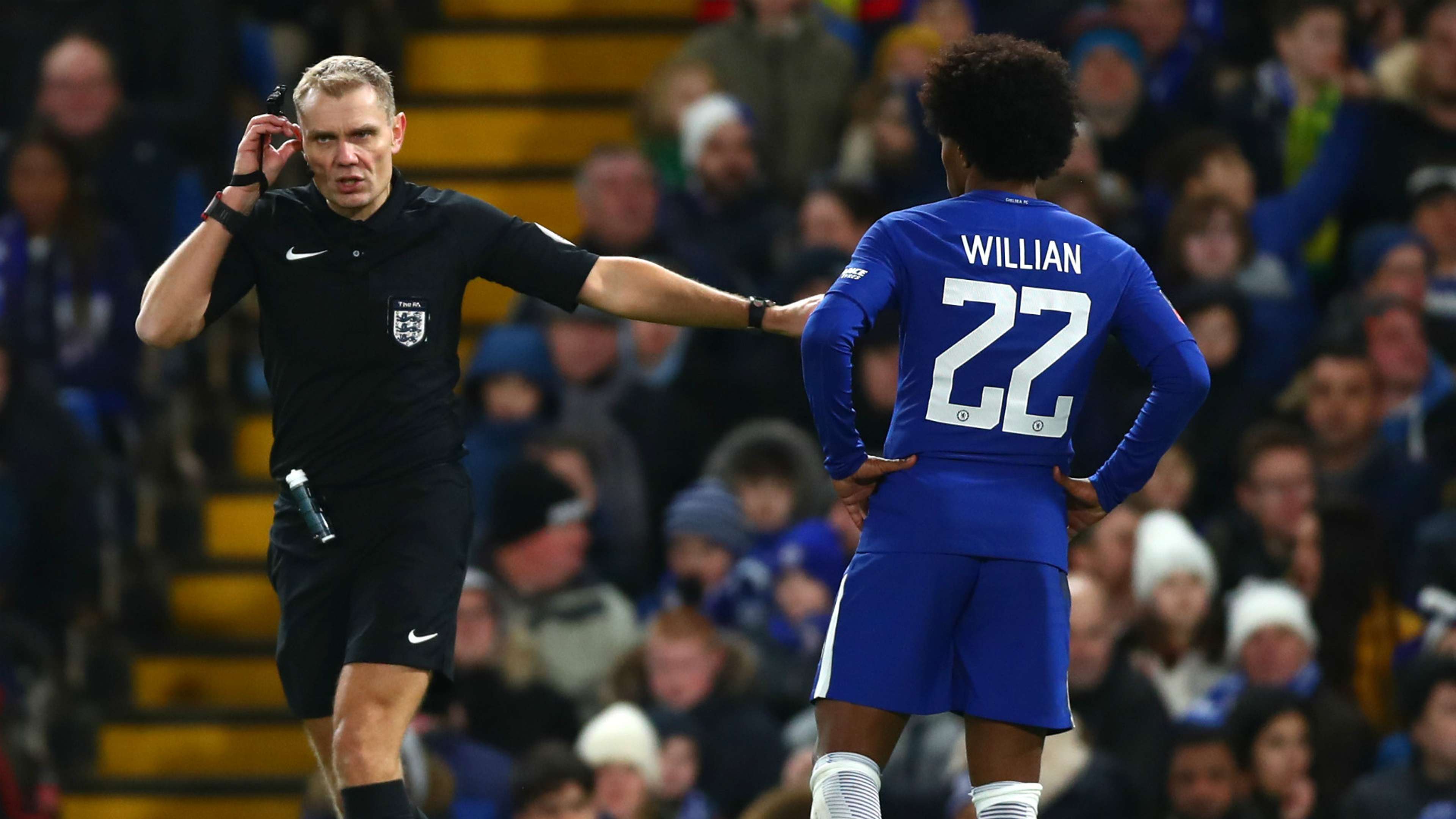One of the biggest talking points in football this season has been the use of VAR (video assistant referee).
Having been utilised in the Confederations Cup last summer, as well as a number of international tournaments, such as the FIFA Under-20 World Cup, VAR was introduced this season in several major European competitions, including Italy's Serie A, Germany's Bundesliga and England's FA Cup.
However, the new system has sparked a lot of controversy in all three countries and Chelsea manager Antonio Conte went on a lengthy tirade on Wednesday night following his side's FA Cup win over Norwich, after Willian was denied what appeared to be a penalty in extra time, and then booked for simulation.
So, is VAR good or bad for football?
Goal's Head of English Language, Sam Brown, and Head of Global Features, Carlo Garganese, go head-to-head over the issue below...
GOOD: VAR WILL END INJUSTICES LIKE 'HAND OF HENRY'
 Getty
GettyBy Sam Brown
One look at Twitter reveals that fans demand " better referees’ " ahead of video technology. This naive viewpoint fails to recognise the current standard of today’s officials. The likes of Mark Clattenburg, Felix Brych and other referees already operate at an exceptional level and due to the speed of the modern game, it’s impossible that human error won’t seep in to matches.
By decreeing the need for better match officials, we’re not entertaining the possibility of allowing true innovation to enter the sport, and true innovation needs a leap of faith and to be radically different to the status quo.
As the apocryphal Henry Ford quote goes: “If I had asked people what they wanted, they would have said faster horses."
VAR has the ability to improve the game, and we need to be mindful that it isn’t here to fix every single perceived issue with the implementation of the rules of the game.
The VARs can only intervene on red cards, penalties, goals or mistaken identity - these are multi-million pound decisions that are being left wide open to interpretation; if governing bodies are able to add a safety net to these decisions, then what comprehensible reason is there that they should not do so?
“But it’ll disrupt the game!” the critics cry. Tell that to Brazil, who were knocked out of the Copa America in 2016 due to an erroneous handball decision.
A decision that was debated for well over two minutes by four officials, and they still came to the wrong decision. I would imagine that Republic of Ireland fans would have been happy to wait an extra few minutes in their World Cup play-off with France 2009 to have had Thierry Henry’s handball offence identified.
Whilst the implementation of VAR hasn’t been flawless, just because it hasn’t worked perfectly and immediately, doesn’t mean it should be stopped and filed in the failed experiment folder along with the 'Golden Goal'. If that’s the attitude that prevailed throughout history, we’d still have two points for a win and the back-pass rule would be seen as a hedonistic pipe-dream.
The Bundesliga and Serie A have shown serious signs of a need to speed things up and improve the decision-making process. But rather than halt proceedings, the governing bodies need to transparently show fans how they’re improving its use.
Using VAR at the World Cup might be too much, too soon, but if your team is denied a blatant penalty in the last minute in the final in Moscow this summer, I guarantee you’ll be far angrier that the safety net wasn’t there to have avoided another sporting injustice.
BAD: VAR KILLS FOOTBALL'S EMOTIONS
 Getty
GettyBy Carlo Garganese
There is a reason why football is the most popular and exciting sport in the world – its simplicity. So, why do we always have to find new ways to spoil our beautiful game?
For true footballing purists, the widespread introduction of VAR this season around Europe has – from an aesthetic point of view - been an unmitigated disaster.
The natural flow and emotion in the game has been devastated due to the constant, lengthy stoppages, as incidents are reviewed. Some reviews take up to five minutes – as players and fans stand around twiddling their thumbs – and there have been matches in Serie A with over 10 minutes of injury time.
This is not football.
"It takes the excitement out of football; players don't hug each other after scoring a goal any more, instead they look straight towards the referee. It's removing the adrenaline and my enjoyment of football," Lazio coach Simone Inzaghi complained.
“Football is about emotions,” sniped Juventus’ Sami Khedira. “Now, players don’t know whether to celebrate a goal or not. That is the death of football.”
Imagine it is the World Cup final. Lionel Messi embarks on an incredible solo run from his own half, beating six players before scoring – only for the goal to be reviewed for an eternity for a possible infringement. Messi, his team-mates and millions of fans wait five minutes before celebrating while exuberant commentators withhold their superlatives – the emotion of the greatest goal in history has been destroyed.
And not content with killing emotions, VAR has proven that it is incapable of making the correct call on many incidents. Very few decisions in football are black and white, such as whether the ball has crossed the line. Goal Line technology (GLT) has been fantastic in this regard – an instant call is made which is always right. But most refereeing decisions are subjective and down to human judgement.
In Germany, there have been numerous high-profile refereeing errors this term – including when Dortmund’s Pierre-Emerick Aubameyang clearly scored with his hand versus Schalke only for VAR not to intervene.
And this raises another big problem with VAR. To be truly impartial to both sides, a referee would have to review all questionable incidents or there is the risk that blatant mistakes like Aubameyang’s goal or the penalty not awarded to Willian are missed. But to review every incident would prompt even more soul-sapping delays.
The idea that VAR has been a success is a myth peddled by those in power who stand to benefit directly from its use. Indeed, a recent poll by Kicker of 219 Bundesliga players revealed that the majority believed it had ruined the game. And ruined the game it certainly has.



